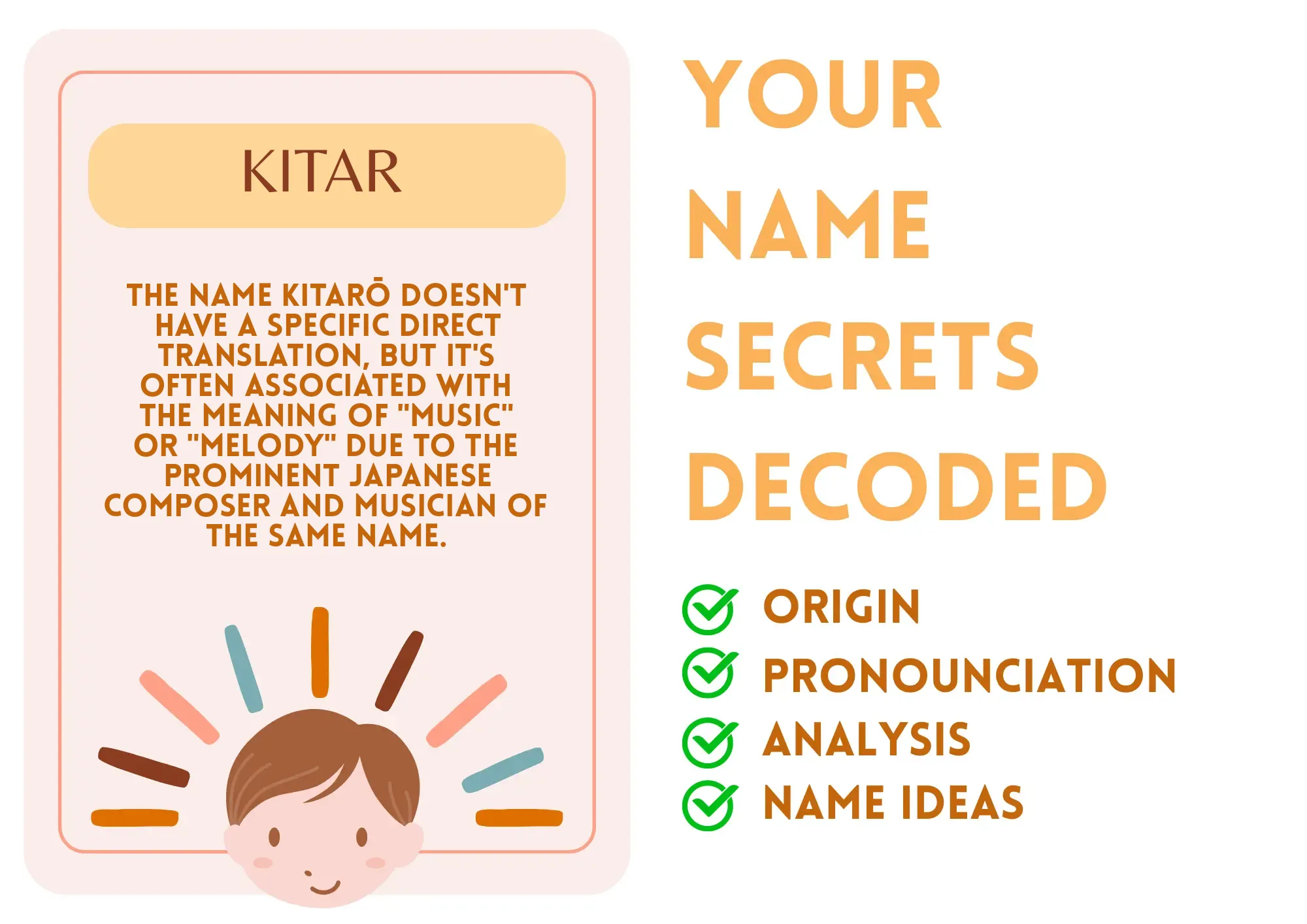
Kitarō
Kitarō is a distinctive Japanese masculine name with a rich cultural tapestry. Traditionally, it can be interpreted as 'joyful great son' or 'son of joy' from its kanji components (喜 meaning 'joy', 太 meaning 'great', and 郎 meaning 'son'). However, its most prominent association in popular culture is with the titular character of the long-running Japanese manga and anime series, 'GeGeGe no Kitarō', a one-eyed yokai boy who fights for peace between humans and supernatural beings.
Beyond popular culture, the name also holds significant historical weight through Nishida Kitarō, a foundational figure in modern Japanese philosophy, and is recognized globally through the acclaimed new-age musician, Kitarō (Masanori Takahashi).
The name evokes a blend of traditional Japanese charm, supernatural adventure, profound intellectualism, and serene musical artistry. While it is straightforward to pronounce for Japanese speakers, non-Japanese speakers might initially mispronounce it. Its unique character makes it a memorable and culturally rich choice.
Basic Information
Gender: Boy
Sounds Like: KEE-tah-roh
Pronunciation Explanation: The 'Ki' is pronounced like 'key', 'ta' like 'tah', and 'ro' like 'roh'. The emphasis is generally even or slightly on the 'roh'.
Summary and Meaning
Meaning: Joyful great son, son of joy (Japanese). In popular culture, it is strongly associated with a one-eyed yokai boy from the 'GeGeGe no Kitarō' series.
Origin: Japanese
Usage: Kitarō is traditionally a masculine name, evidenced by the suffix '郎' (rō), which is common in Japanese male names.
Name Number (Chaldean)
Name Number (Pythagorean)
Popularity (Global Rank)
Overall: 159842
Boys:
Most Popular in
Religious and Cultural Significance
Religion: Shintoism, Buddhism (cultural influence)
Background: While not directly religious, the name Kitarō is deeply embedded in Japanese culture. The 'GeGeGe no Kitarō' character draws heavily from Japanese folklore (yokai), which often has roots in Shinto beliefs and traditional spiritualism.
Cultural Significance: The name carries significant cultural weight due to its association with a beloved folk hero (Kitarō the yokai), a revered philosopher (Nishida Kitarō), and an internationally recognized musician (Kitarō). It represents elements of Japanese storytelling, intellectual tradition, and artistic expression.
Historical Significance: The most notable historical figure bearing this name is Nishida Kitarō (1870–1945), a prominent Japanese philosopher and the founder of the Kyoto School of philosophy. His work profoundly influenced modern Japanese thought and engaged with Western philosophy while drawing on Zen Buddhism.
Popular Culture
Literature and Mythology: The most famous use is 'GeGeGe no Kitarō', a highly influential manga series (1959–present) by Shigeru Mizuki, which has been adapted into numerous anime series, films, and video games. Kitarō is a yokai boy who acts as a mediator and protector between the human and supernatural worlds.
Movies and Television: The character Kitarō from 'GeGeGe no Kitarō' has appeared in countless anime television series and films, making him one of Japan's most iconic and enduring pop culture figures. Additionally, the new-age musician Kitarō (born Masanori Takahashi) is internationally renowned for his Grammy and Golden Globe award-winning compositions, particularly his soundtrack for 'Heaven & Earth'.
Feelings and Perceptions
Perception: Kitarō is generally perceived as a unique and culturally rich name. For those familiar with Japanese culture, it evokes a sense of tradition, folklore, and artistic depth. It can be seen as adventurous due to the yokai character, intellectual due to the philosopher, and serene due to the musician.
Positive Feelings: Unique, traditional, adventurous, artistic, intellectual, culturally rich, memorable.
Negative Feelings: Might be unfamiliar to non-Japanese speakers, potential for initial mispronunciation, strong association with a specific character might overshadow personal identity for some.
Practical Considerations
Ease of Writing and Calling: For Japanese speakers, Kitarō is straightforward to write and pronounce. For non-Japanese speakers, the 'ō' (long 'o' sound) might require a slight adjustment, but the name is generally easy to call once the pronunciation is known.
Common Typos and Misspellings: Kitaro,Keetaro,Kitairo,Kitarou
Common Nicknames: Kita,Taro
Kitarō Popularity
Kitarō Usage and Popularity By Country
| Country | Rank (Overall) |
|---|
Kitarō Usage and Popularity By City
| City | Rank (Overall) |
|---|---|
| Santiago | 4490 |
| Sao Paulo | 30454 |
Compatibility Analysis
Success Mantra for Kitarō
Keep pushing forward.
Inspire others with your passion.
Transform challenges into opportunities.
Aim high and dream big.
Rise above your fears.
Open your heart to possibilities.
Alphabet Analysis for Kitarō
Keen
Innovative
Thoughtful
Adventurous
Resourceful
Outstanding
Acrostic Poetry for Kitarō
Kooky sense of humor, always bright
Inquisitive mind, questions take flight
Takes joy in mischief, never too far,
Amusing tales told, a true shining star.
Rarely is serious, laughter's his game,
Overflowing with fun, you'll never be tame.
A Fun Roast for Kitarō
Kinda awkward, can't find the beat,
In your presence, I'm losing my seat,
Try to impress, but it's all for show,
Always failing, and that’s your flow,
Regrets swallow you, deep as the sea,
Oh please, spare us your cringy decree.
A Love Poem for Kitarō
Kisses like whispers, soft under the moon,
In your sweet laughter, I find my own tune.
Together we dance, as blossoms in spring,
A world full of color, your love is my king.
Radiant dreams woven, as stars light the sea,
Oh, my dear Kitarō, forever we'll be.
Famous Persons Named Kitarō
-
-
-
Kitarō Kōsaka
Born: February 28, 1962 - Kanagawa Prefecture
film director | character designer | animator | cinematographer
-
-
-
Related Names
Similar Sounding Names:
Kentaro,Ryotaro,Kotaro,Jiro,Ichiro
Similar Meaning and Related Names:
Daisuke ♂️
Sibling Name Ideas (Brothers):
Ren ♀️
Buddhist, Shinto (Japanese), Confucian (Korean)